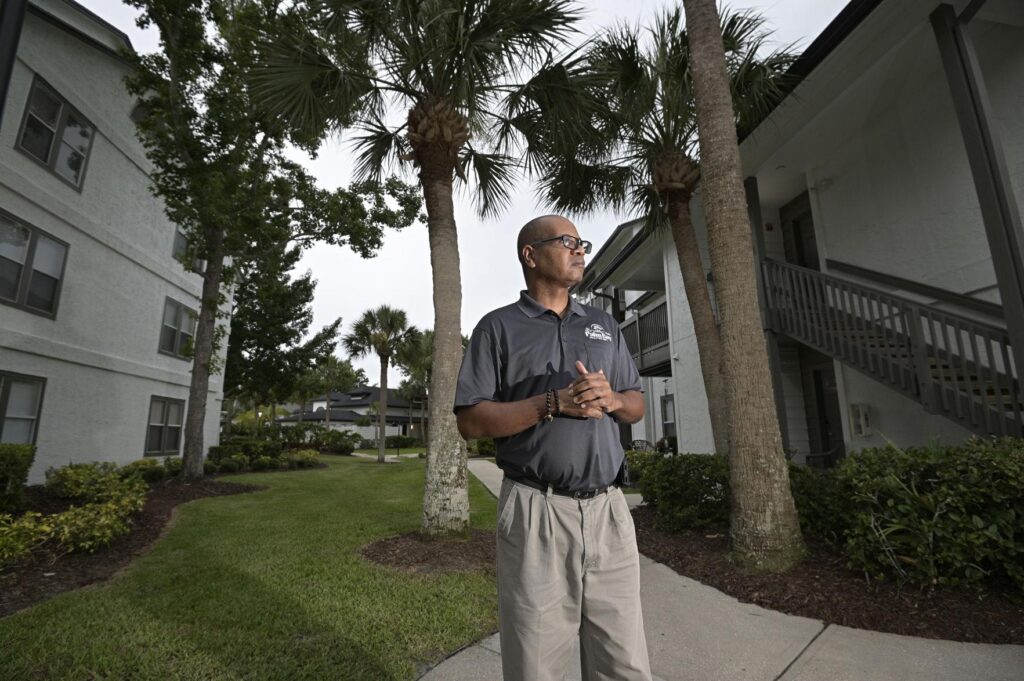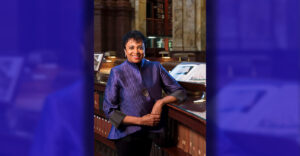Marshals Service employees have alleged racism for decades. Their case may finally be heard.

Randy Foster says he left the Marshals Service after being passed over for more than 50 promotions over roughly two decades. He is now on the city council in Palm Bay, Fla. MUST CREDIT: Photo for The Washington Post by Phelan M. EbenhackPhelan M. Ebenhack
By the time a jury awarded him $4 million, Matthew Fogg had spent about 13 years fighting to prove that racism derailed his career at the United States Marshals Service. Hearing the verdict in 1998, he wept.
Weeks of testimony from more than 30 people had convinced jurors that Fogg was up against something pervasive: a “hostile” environment for Black employees, as a judge later summarized. Yet decades later, a class action bearing Fogg’s name – and in which more than 10,000 people may have a stake – continues to inch forward.
The end is in sight, lawyers say. An administrative judge for the Equal Employment Opportunity Commission, the federal agency that investigates claims of workplace discrimination, could soon hear the evidence after years of procedural delay. But employees past and present awaiting the outcome say that any vindication will be tempered by disillusionment over the journey to this moment. Many class members have left the agency. Some are ailing and unable to testify, attorneys said. Others have died.
“It’s a never-ending battle,” said Fogg, now 70. That it’s taken so long is unsurprising, he said, because “the culture of racism is so embedded in America – is so deep.”
In interviews with The Washington Post, 15 current and former Black employees of the Marshals Service detailed allegations of racial bias that undercut career advancement. They say one of the country’s oldest federal law enforcement agencies – tasked with protecting courthouses, transporting prisoners, shielding witnesses and tracking down fugitives – has failed to confront decades of discrimination.
They recounted stories of debilitating stress; needlessly contentious hiring interviews that could end after a single question; job openings suddenly closed after Black people rose to the top of the selection process; and indignation at training White newcomers who quickly became their supervisors. Some estimate they lost out on hundreds of thousands of dollars in income. Many remembered White colleagues telling racist jokes or using the n-word to demean fellow employees and prisoners of color, without apparent repercussions.
The Marshals Service declined to answer questions about the class action or its members’ underlying complaints of institutional racism. A spokesman, James P. Stossel, deputy chief of public affairs, said agency policy does not allow officials to speak with the news media about ongoing litigation.
Class members are seeking individual compensation and “systemic relief” – which lawyer Saba Bireda said should start with the Marshals Service vowing to change. “We’re really looking for a new system,” she said.
Responding to a federal discrimination lawsuit that overlapped with Fogg’s case, Justice Department officials in 2012 denied that the Marshals Service has a “long history of continuing discrimination” or that a “good old boy network” is biased against African Americans, court papers from that case show. Officials also argued then that the Marshals Service “took reasonable care to prevent and promptly correct race-based harassment.” The lawsuit was dismissed after lawyers for the plaintiffs said the pending EEOC case covered their claims, and some complainants reached individual settlements with the government, according to court documents.
Critics of the agency’s record on racial equity see an opening for change with the Biden administration’s appointment of a new agency director, Ronald Davis, who as the former executive director of President Barack Obama’s policing task force has denounced deep-rooted racism in law enforcement. Davis is Black, as was his predecessor.
Two current Black employees of the Marshals Service, speaking on the condition of anonymity because of a fear of retaliation, said they believe discrimination remains a problem at the agency, echoing others who have retired in the past few years.
“There was a time where the overt racism was the predominant source of racism – you know, the nooses on people’s desks and that type of thing,” said one current employee, who recalled getting a promotion in the past few years only after filing an EEO complaint. “I think I’m kind of more in the era of institutionalized racism, where it’s built into the processes. People are nice to you in your face. When you peel all the layers back, the core of it’s still there and it’s still perpetuating.”
The other current employee said his managers have never acknowledged allegations of hiring discrimination he made against them in an EEO complaint. Officials did not find discrimination, but this employee believes the filing sent superiors scrambling to hire minorities.
“I know these people,” this person said. “Not one time did they come over to me and say, ‘Hey, that’s not how we are. That’s not who we are.’ “
Other federal law enforcement agencies have resolved similar long-running class actions alleging racial discrimination. The FBI settled and promised reforms in the 1990s. In 2017, the Secret Service agreed to pay $24 million to Black agents claiming bias in its promotion process.
The Marshals Service has been unwilling to come to the table in a similar way, said lawyer David Sanford, whose firm Sanford Heisler Sharp represents the class-action members – more than 700 current and former employees, plus thousands more unsuccessful job applicants. That the case has languished for so long is “unconscionable,” Sanford said.
The EEOC closed the case in 1997 but reopened it in 2006, attributing its earlier decision to a clerical misunderstanding. Lawyers expect to get a hearing date soon, though the class action could end in a settlement.
An equal-employment expert hired by plaintiffs in the federal lawsuit concluded that African Americans were significantly underrepresented in prestigious divisions and promotions from 2007 to 2012. The agency’s expert argued that the analysis was flawed and said that “borderline statistically significant” disparities in hiring decisions would vanish if not for just a few outcomes.
The Marshals Service has acknowledged some problems over the years, telling the EEOC in a 2000 report that it was reworking its deputy hiring exam after the test was found to have a “significant adverse impact” on African Americans. In the early 1990s, an agency report described a gap in job satisfaction between Black and White employees, and widespread perceptions among personnel that a “good old boy network” disenfranchised minorities.
But lawyers behind the class action argue the Marshals Service has never meaningfully addressed Black employees’ concerns and said they are unaware of any broad review of the agency’s racial climate since the 1990s.
“What case goes on for 27 years, of this magnitude, and can be kept so quiet?” asked former D.C. deputy marshal Robert Byars, 63, who retired from the Marshals Service in 2020. He spent nearly two decades in lower-ranking and lower-paying positions before becoming a deputy – thwarted, he argued, by a culture where racism went unreported or unpunished.
Fogg eventually went public with his complaints about the Marshals Service. A 1997 New York Post series titled “Bigots with badges” featured Fogg and two partners – one Black, one White – who described rampant abuse, including racial slurs and threats for speaking out, as well as White colleagues using a picture of Martin Luther King Jr. for target practice. The Marshals Service declined to comment on the claims at the time.
CBS News covered the story 1999. The Marshals Service again declined to discuss specific claims but said it took discrimination complaints seriously.
“Is it fair to paint us with a broad brush just because there have been discrimination complaints filed?” Debbie Ridley, a Black official in the agency’s equal-employment office, said in an interview for CBS’s two-part series. “The answer to that is no. … Do Black marshals feel that they have a problem being promoted in the Marshals Service? Yes, they do.”
Contacted recently, Ridley said she worked for the agency only briefly and did not remember enough from her tenure there to discuss the accusations of discrimination.
Louie McKinney, a longtime employee of the Marshals Service who served as acting director under President George W. Bush, said in an interview that racism remained a serious issue there when he left in the early 2000s. But “now … things are different,” he said.
“We’ve got Black people in top jobs right now, you know. Things that I started years ago, so I’m very proud of that,” said McKinney, who was the second Black person to lead the agency and now serves as president of the U.S. Marshals Service Association, an organization of current and retired employees.
In interviews, current and former employees gave detailed accounts of their allegations, some of which are described in the class-action complaint. The Marshals Service declined to discuss their individual claims.
Paul Rivers joined the Marshals Service in 1990 after four years in the Marine Corps and experience in nuclear security. He was recognized with a Purple Heart after the Beirut barracks bombing that hospitalized him and killed 241 of his fellow service members.
Rivers was determined to get promoted, he said, and thinks he did everything right. He taught colleagues about weapons of mass destruction and helped write agency policy on them, he said. He took on extra projects and earned three college degrees while working, including a $25,000 master’s in strategic leadership that sent him into debt.
Yet when Rivers left the Marshals Service in 2017, he said, he held the lowest possible rank for a supervisor. He said he had been stuck there about 15 years.
“Each time, you know, I put out the effort to improve myself, thinking … ‘Let me try even harder,’ ” he said. “I put it on myself to push harder. And each time I was met with another brick wall.”
Rivers described a toxic culture in which some White colleagues showed open disdain for Black people. “You know why they call that place Division Street?” Rivers recalled a high-ranking White official in the Marshals Service asking him during a stint in Orlando, referring to a road that once separated Black and White neighborhoods. “Because Blacks were on one side and Whites were on the other, and they knew their place.”
The former official, when reached by The Post, acknowledged having told others about the street but never using those words. Rivers said he didn’t report the comments right away because at the time, he was battling the agency over his eligibility for a top-secret security clearance, which he said had been called into question after someone put false information in a background investigation, including a claim that Rivers had schizophrenia. By the time he felt he could report the “Division Street” comments, he said, staff at the Marshals Service headquarters told him it was too late.
In 2017, Rivers said, he retired early, sick of watching less qualified White colleagues get preferential treatment and “continue up the ladder where I got left behind.”
“You can only keep hitting that wall with your head so many times before your head starts to hurt,” said Rivers, now in his 50s. After years of fruitless complaints, he said, “I was tired of fighting.”
Former Georgia criminal investigator deputy Regina Holsey recalled her first day on the job in 1995, when the White receptionist asked if Holsey was a “voluntary surrender.” Fifteen years later, Holsey said, she was disrespected again when a position was abruptly canceled within minutes of her completing what she felt had been a strong interview. The job reopened months later with a more advanced Spanish-language requirement – she no longer qualified – and went to a White Hispanic colleague who, she said, ridiculed her driving and said she was like the “little Black lady on ‘Police Academy.’ ” She declined to identify the colleague.
An expert who analyzed several years of “canceled” positions for the agency as part of the now-dismissed lawsuit said that six out of 37 had Black candidates ranked first for the job.
Tracy Bryce, who left in 2015 after holding the same position in D.C. for two decades, said she eventually stopped applying for the higher-paying job of deputy marshal. Once, Bryce said, officials told her that she had to interview in Ohio, and she paid to fly there, only to realize later that White candidates for deputy were interviewed in D.C.
Another time, Bryce said, a hiring panel asked her one question – “Do you drink alcohol?” – and refused to accept her response that, no, she did not. Bryce said the interview was ended at that point.
White colleagues used the n-word for Black prisoners into the 2000s, Bryce said, even addressing people with the slur while giving commands. One of the agency’s current employees detailed several instances of White colleagues using the n-word, including to describe another member of the agency.
The class action touches on alleged racist comments only in passing, but its members recounted a range of offensive language, including White deputies who called Black colleagues “boy” and “monkey man.” They also mentioned repeated problems with violence against Black inmates in one cellblock in D.C.
“I think that the code of silence pervades, and people thought perhaps they could get away with events like this,” a federal judge said in 2008, noting the many Marshals Service members in the courtroom as she sentenced Stephen Cook, a White former deputy in D.C., to 24 months in prison for beating a handcuffed Black man.
When a deputy was recorded calling a suspect the n-word in 2018, the Marshals Service put the Ohio employee on administrative leave and said it had “zero tolerance for this type of behavior, which does not represent our agency’s core values of justice, integrity and service.” Later that year, an official said the unidentified employee was no longer with the agency, local media reported.
Bryce, 55, said that many Black employees of the Marshals Service stopped reporting incidents because “nothing got done.” But she said she felt compelled to do so when, for the first time in her Marshals Service career, a White colleague made her fear for her safety. She said she was escorting prisoners sometime in the 2000s – wearing a black suit, carrying a briefcase – when a White deputy walked up and demanded that she show ID. When Bryce refused, she said, the deputy shoved her against a wall.
Bryce said she made a written report on the incident and told her superiors but does not believe the White deputy faced discipline. The Post was unable to reach the man she claims shoved her.
Former Black employees who advanced into leadership positions while at the agency also said their path was harder. Thomas Hedgepeth, who led an office in D.C., said officials took just long enough to clear him of misconduct allegations that he had to relinquish a promotion, after missing a day of training. Sylvester Jones said he was confirmed as one of the agency’s first African American assistant directors – but only following a months-long delay, after an anonymous complaint raised allegations of misconduct that already had been investigated and rejected.
Jones contrasted his experience with that of White colleagues. One, Jones said, was so confident he’d get a job that he put his house on the market. Another, who joined the agency a few years after Jones, had two big promotions announced a day apart.
McKinney, the former acting director, recalled having to fight for Jones’s appointment when White colleagues sought to derail the confirmation process. “I’m the director. … He’s very well qualified. … So why can’t he have the job?” he said.
Former deputy Randy Foster said he applied for more than 50 promotions over roughly two decades. He received only a handful of interviews, he said, despite an extensive military background, experience in law enforcement and high-profile assignments protecting Supreme Court Justice Antonin Scalia and the judge who sentenced conspirators in the 1993 World Trade Center bombing. Foster, too, recounted positions “canceled” when he was marked a top candidate.
Now 58, he said his old agency owes justice to people “putting their life on the line.”
Three class-action members Foster knew have died. He ticks through all the presidencies the case has outlasted: Clinton, Bush, Obama, Trump.
“Doesn’t matter what political party is in office, discrimination is wrong,” Foster said. “And they have an opportunity.”
On a recent conference panel of Black professionals held over Zoom, Fogg was introduced simply as a retired member of the Marshals Service. But his long war against the agency loomed over the discussion on social justice and policing. Behind Fogg was a copy of the New York Post’s “Bigots with badges” Sunday cover story from 1997.
A mix of current and former members of law enforcement talked about their dreams of changing stubborn systems from within. They spoke about the Black Lives Matter movement that had put a new national spotlight on the issues they raised many years ago.
Individual officers’ actions are “a pebble in the ocean,” one panelist lamented. “You know, as opposed to really looking at the root causes of things.”
“I still have to be very careful speaking out,” said one Black police official. “Because again, I have bills to pay.” The speaker warned about people who find creative ways to “get rid of you.”
Fogg said he had seen it all.
“When you really take a stand against that institution, you know they’re gonna come after you,” he said. “All of us know that.”
The Washington Post





